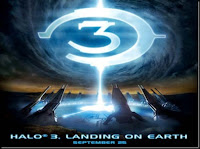 New York Times has a story (Thou Shalt Not Kill, Except in a Popular Video Game at Church) that some churches are using Halo 3 video game as a recruitment tool. One tiny problem is that Halo 3 is violent and is rated M for Mature audiences - oh well...but its all for a good cause:
New York Times has a story (Thou Shalt Not Kill, Except in a Popular Video Game at Church) that some churches are using Halo 3 video game as a recruitment tool. One tiny problem is that Halo 3 is violent and is rated M for Mature audiences - oh well...but its all for a good cause:Those buying it must be 17 years old, given it is rated M for mature audiences. But that has not prevented leaders at churches and youth centers across Protestant denominations, including evangelical churches that have cautioned against violent entertainment, from holding heavily attended Halo nights and stocking their centers with multiple game consoles so dozens of teenagers can flock around big-screen televisions and shoot it out.As expected, this activity is coming under criticism. But here is a line of defense:
Far from being defensive, church leaders who support Halo — despite its “thou shalt kill” credo — celebrate it as a modern and sometimes singularly effective tool. It is crucial, they say, to reach the elusive audience of boys and young men.
Witness the basement on a recent Sunday at the Colorado Community Church in the Englewood area of Denver, where Tim Foster, 12, and Chris Graham, 14, sat in front of three TVs, locked in violent virtual combat as they navigated on-screen characters through lethal gun bursts. Tim explained the game’s allure: “It’s just fun blowing people up.”
Once they come for the games, Gregg Barbour, the youth minister of the church said, they will stay for his Christian message. “We want to make it hard for teenagers to go to hell,” Mr. Barbour wrote in a letter to parents at the church.
"Its just fun blowing people up"... and I guess it becomes even more fun when it is interpreted in a religious tone:
At Sweetwater Baptist Church in Lawrenceville, Ga., Austin Brown, 16, said, “We play Halo, take a break and have something to eat, and have a lesson,” explaining that the pastor tried to draw parallels “between God and the devil.”
Players of Halo 3 control the fate of Master Chief, a tough marine armed to the teeth who battles opponents with missiles, lasers, guns that fire spikes, energy blasters and other fantastical weapons. They can also play in teams, something the churches say allows communication and fellowship opportunities.
Complicating the debate over the appropriateness of the game as a church recruiting tool are the plot’s apocalyptic and religious overtones. The hero’s chief antagonists belong to the Covenant, a fervent religious group that welcomes the destruction of Earth as the path to their ascension.
hmm...what happened to Pac-Man? We can talk about ghosts and afterlife in a lot less violent way - though we don't really know what happens after the ghosts inevitably capture Pac-Man.
Read the full New York Times article about Church-Halo connection here.


1 comments:
Wow!
Post a Comment